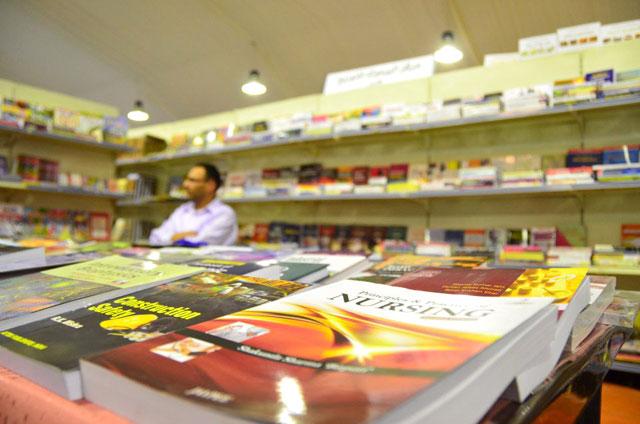You are here
Publishing sector reels from cancellation of book fairs, urges gov’t stimulus measures
By Bahaa Al Deen Al Nawas - Jun 28,2020 - Last updated at Jun 28,2020

This photo was taken at the Amman International Book Fair in 2012. As of yet, no decisions have been made about holding the fair this year, according to its manager (JT file photo)
AMMAN — The coronavirus crisis has damaged many sectors and the livelihoods of numerous people, with its repercussions extending to culture-related fields. This impact is exemplified in the publishing sector, which has suffered “more damage than it already faced, with book fairs being cancelled around the world”, according to stakeholders.
President of the Jordanian Publishers Union Jaber Abu Fares told The Jordan Times over the phone on Sunday that publishers in Jordan “depend greatly” on their participation in Arab and international books fairs.
The cancellation of the fairs “will impact the sector significantly, causing an economic crisis for Jordanian publishers, who lack the support of the local market and the interest of official institutions”, Abu Fares said.
The publishers union president predicts that the sector will see “fewer new publications and will probably be unable to continue delivering its messages if not supported by the government, higher education institutions and the private sector”.
In mid-March, the union took several steps to improve the sector and combat the impact of the crisis, Abu Fares said.
The first step was sending an official letter to the prime minister and the minister of culture listing the challenges facing the publishing sector due to the pandemic and demanding support to overcome the economic crisis caused by the closure of markets as well; especially universities and schools.
“The sector has deteriorated internationally due to the postponement of all book fairs, which are a breather for publishers, who have lost all markets,” the union president said, noting that the sector “will fall apart” without the government’s support.
When the curfew was imposed in mid-March and institutions closed their doors to prevent the virus’ spread, the union’s administrative board formed a committee comprising a general authority to draft plans and come up with solutions to overcome the repercussions of the crisis, according to Abu Fares.
The committee conducted a survey to obtain information from each publisher in order to update their data with the union and to ascertain how many run online platforms and social media accounts alongside their annual publication volume.
The survey showed that no more than 30 per cent of publishers in Jordan make use of online platforms, which is why workshops will be held after the crisis is over in order to clarify the importance of utilising technology and online publishing.
Abu Fares also manages the Amman International Book Fair, and he said that to date, there are no decisions regarding the possibility of holding the fair this year, noting that the question will be answered in mid-July according to the health situation and expert input and in adherence to current and future government procedures.
“There is a debate on holding the fair for Jordanian publishers only, or allowing Arab publishers as well,” Abu Fares said, noting that the decision is seen as a “positive step” as long as the pandemic continues.
As an example of challenges facing the sector, the union president pointed to online websites that share the publications of publishers in PDF format without prior approval. Piracy, he said, makes books available with no respect for the publishers’ rights.
“The union is working continuously with the Department of the National Library and the authorities to stand in the face of this new and dangerous phenomenon facing the local economy,” Abu Fares said.
For his part, General Manager at Alaan Publishers and Distributors Basem Al Zoubi reiterated the negative impact of postponing book fairs, especially for workers in the field, as such a step hinders book publication and sales.
In light of the halting of book fairs, the Amman book fair “has a big chance to make up for what publishers lost due to the coronavirus, which requires the fair’s management to prepare very well in order to garner the hoped-for benefits, compensating readers as well for the absence of other fairs,” he said.
With the shift to digital reading, Zoubi noted that “it is too early” to judge the situation of paper books in the Arab world, noting that sales average at 1/8 of a book per person each year, while in Europe, the average is at 35 books per person annually.
“There are many Arab societies that still face poverty and illiteracy, and so digital books will not be the suitable solution for the reading crisis in the Arab world, making the need for paper books more lasting for many years to come,” the general manager said.
He reiterated the sector’s need for government support, noting that the coronavirus crisis “has only increased” the crisis Arab publishers were already facing.
“The publishing sector was not ready to face such conditions. Publishing houses have been affected a lot by the suspension of book fairs and the idea of digital fairs was not very effective, especially for households that depend on paper publications,” Zoubi said.
Related Articles
AMMAN — Deputising for Her Majesty Queen Rania, Minister of Culture and Youth Mohammad Abu Rumman on Monday opened the third regional confer
AMMAN — Last week, Jabal Amman Publishers launched the first virtual book fair in an attempt to make up for the missed book fairs schools no
AMMAN — Deputising for His Majesty King Abdullah, Culture Minister Nabih Shuqum on Wednesday night attended the inauguration of the 16th Amm















